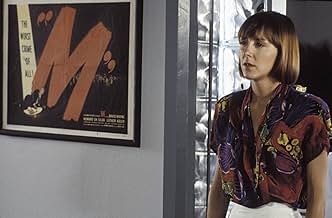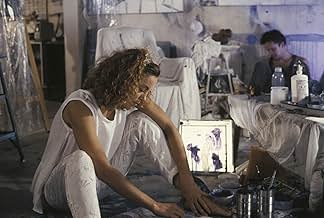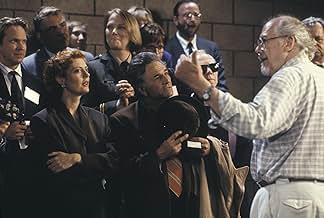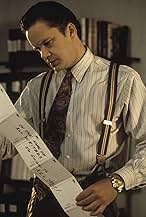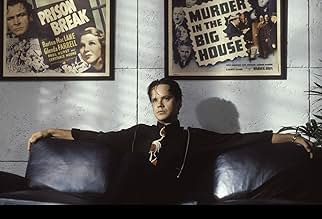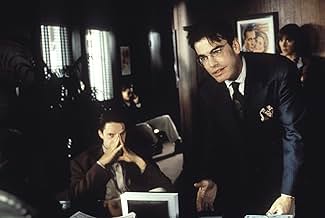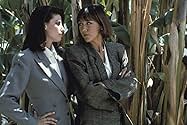The Player
- 1992
- Tous publics
- 2h 4m
A hotshot Hollywood studio executive starts receiving death threats from a rejected writer.A hotshot Hollywood studio executive starts receiving death threats from a rejected writer.A hotshot Hollywood studio executive starts receiving death threats from a rejected writer.
- Nominated for 3 Oscars
- 24 wins & 33 nominations total
Featured reviews
I am surprised that the IMDb trivia section is so short for this film. After all, it's jammed full of references to earlier films and is full of actor cameos. Because of this, it's clearly a film that bears re- watching in order to catch the many small details many would often miss. Also, because this film is ultra-famous, already has many reviews and is beloved by many, I'll keep my review relatively short. Suffice to say that it's a film lovers and insiders dream movie.
The film begins with an insanely difficult scene that sets the stage for the film. It's all in one long take where the camera moves all over a wide area on a film studio lot. But instead of being intimate, it feels almost like the viewer is hiding and peering at the many different things occurring simultaneously. This is brilliant, as the film does have a real voyeuristic quality...with many shots that are not traditionally framed but are as if you are watching in the near distance.
What follows is a very dark anti-fairy tale set in modern Hollywood. Instead of the usual story of a person working hard and doing good and ultimately being rewarded, this is pretty much the opposite. With a total jerk-face (Tim Robbins) screwing people over and even killing someone...and the consequences of this. It's obviously meant as an attack on many Hollywood types--the users, the superficial and the vaguely talented. Overall, a superb film that works very well due to wonderful direction and a black hole-dark script filled with cynicism.
The film begins with an insanely difficult scene that sets the stage for the film. It's all in one long take where the camera moves all over a wide area on a film studio lot. But instead of being intimate, it feels almost like the viewer is hiding and peering at the many different things occurring simultaneously. This is brilliant, as the film does have a real voyeuristic quality...with many shots that are not traditionally framed but are as if you are watching in the near distance.
What follows is a very dark anti-fairy tale set in modern Hollywood. Instead of the usual story of a person working hard and doing good and ultimately being rewarded, this is pretty much the opposite. With a total jerk-face (Tim Robbins) screwing people over and even killing someone...and the consequences of this. It's obviously meant as an attack on many Hollywood types--the users, the superficial and the vaguely talented. Overall, a superb film that works very well due to wonderful direction and a black hole-dark script filled with cynicism.
"Players only love you when they're playing." --Stevie Nicks
Griffin Mill, whose name has a kind of ersatz Hollywood feel to it (cf., D. W. Griffith/Cecil B. De Mille), is not a player with hearts so much as a player with dreams. He is a young and powerful film exec who hears thousands of movie pitches a year, but can only buy twelve. So he must do a lot of dissembling, not to mention outright lying, along with saying "We'll get back to you," etc. This is what he especially must say to writers. And sometimes they hold a grudge. In this case one of the rejected writers begins to stalk Griffin Mill and send him threatening postcards. And so the plot begins.
Tim Robbins, in a creative tour de force, plays Griffin Mill with such a delightful, ironic charm that we cannot help but identify with him even as he violates several layers of human trust. The script by Michael Tolkin smoothly combines the best elements of a thriller with a kind of Terry Southern satirical intent that keeps us totally engrossed throughout. The direction by Robert Altman is full of inside Hollywood jokes and remembrances, including cameos by dozens of Hollywood stars, some of whom get to say nasty things about producers. The scenes are well-planned and then infused with witty asides. The tampon scene at police headquarters with Whoopi Goldberg is an hilarious case in point, while the sequence of scenes from Greta Scacchi's character's house to the manslaughter scene outside the Pasadena Rialto, is wonderfully conceived and nicely cut. Also memorable is the all black and white dress dinner scene in which Cher is the only person in red, a kind of mean or silly joke, depending on your perspective. During the same scene Mill gives a little speech in which he avers that "movies are art," a statement that amounts to sardonic irony since, as a greedy producer, he cares nothing at all about art, but only about box office success. His words also form a kind of dramatic irony when one realizes that this movie itself really is a work of art. As Altman observes in a trailing clip, the movie "becomes itself." The Machiavellian ending illustrates this with an almost miraculous dovetailing. This is the kind of script that turns most screen writers Kermit-green with envy.
Incidentally, Joe Gillis, the Hollywood writer played by William Holden in Sunset Boulevard--personifying all unsuccessful screen writers--actually does call during the movie, but Mill doesn't recognize the name and has to be told he is being put on, further revealing the narrow confines of his character.
In short, this is a wonderfully clever, diabolically cynical satire of Hollywood and the movie industry. This is one of those movies that, if you care anything at all about film, you must see. Period. It is especially delicious if you hate Hollywood. It is also one of the best movies ever made about Hollywood, to be ranked up there with A Star is Born (1937) (Janet Gaynor, Fredric March); Sunset Boulevard (1950); A Star is Born (1954) (Judy Garland, James Mason); and Postcards from the Edge (1990).
I must add that in the annals of film, this has to go down as one of the best Hollywood movies not to win a single Academy Award, although it was nominated for three: Best Director, Best Adapted Screenplay and Best Editing. I suspect the Academy felt that the satire hit a little too close to home for comfort.
(Note: Over 500 of my movie reviews are now available in my book "Cut to the Chaise Lounge or I Can't Believe I Swallowed the Remote!" Get it at Amazon!)
Griffin Mill, whose name has a kind of ersatz Hollywood feel to it (cf., D. W. Griffith/Cecil B. De Mille), is not a player with hearts so much as a player with dreams. He is a young and powerful film exec who hears thousands of movie pitches a year, but can only buy twelve. So he must do a lot of dissembling, not to mention outright lying, along with saying "We'll get back to you," etc. This is what he especially must say to writers. And sometimes they hold a grudge. In this case one of the rejected writers begins to stalk Griffin Mill and send him threatening postcards. And so the plot begins.
Tim Robbins, in a creative tour de force, plays Griffin Mill with such a delightful, ironic charm that we cannot help but identify with him even as he violates several layers of human trust. The script by Michael Tolkin smoothly combines the best elements of a thriller with a kind of Terry Southern satirical intent that keeps us totally engrossed throughout. The direction by Robert Altman is full of inside Hollywood jokes and remembrances, including cameos by dozens of Hollywood stars, some of whom get to say nasty things about producers. The scenes are well-planned and then infused with witty asides. The tampon scene at police headquarters with Whoopi Goldberg is an hilarious case in point, while the sequence of scenes from Greta Scacchi's character's house to the manslaughter scene outside the Pasadena Rialto, is wonderfully conceived and nicely cut. Also memorable is the all black and white dress dinner scene in which Cher is the only person in red, a kind of mean or silly joke, depending on your perspective. During the same scene Mill gives a little speech in which he avers that "movies are art," a statement that amounts to sardonic irony since, as a greedy producer, he cares nothing at all about art, but only about box office success. His words also form a kind of dramatic irony when one realizes that this movie itself really is a work of art. As Altman observes in a trailing clip, the movie "becomes itself." The Machiavellian ending illustrates this with an almost miraculous dovetailing. This is the kind of script that turns most screen writers Kermit-green with envy.
Incidentally, Joe Gillis, the Hollywood writer played by William Holden in Sunset Boulevard--personifying all unsuccessful screen writers--actually does call during the movie, but Mill doesn't recognize the name and has to be told he is being put on, further revealing the narrow confines of his character.
In short, this is a wonderfully clever, diabolically cynical satire of Hollywood and the movie industry. This is one of those movies that, if you care anything at all about film, you must see. Period. It is especially delicious if you hate Hollywood. It is also one of the best movies ever made about Hollywood, to be ranked up there with A Star is Born (1937) (Janet Gaynor, Fredric March); Sunset Boulevard (1950); A Star is Born (1954) (Judy Garland, James Mason); and Postcards from the Edge (1990).
I must add that in the annals of film, this has to go down as one of the best Hollywood movies not to win a single Academy Award, although it was nominated for three: Best Director, Best Adapted Screenplay and Best Editing. I suspect the Academy felt that the satire hit a little too close to home for comfort.
(Note: Over 500 of my movie reviews are now available in my book "Cut to the Chaise Lounge or I Can't Believe I Swallowed the Remote!" Get it at Amazon!)
At times it feels like a period piece or is it that we're so used to the horror. A world populated by the shallowest, opportunistic bunch of ignoramuses the world has ever know. How can art come out of that? I think that when it does it's just an accident of Casablanca proportions. Robert Altman who knows a thing or two about it tells us the horror story with the most everyday approach. Tim Robbins is perfect as that empty designer clothed excecutive with a tinge of self awareness. I had to take a shower after the film was over and remove myself from that world.
10Doc-134
Come next year, when I am trying to devise a list of the best films of the 90's, Robert Altman's "The Player" will be near the top of my list. This film skillfully creates a central plot around Griffin Mill (Tim Robbins) (who hears about 125 movie pitches per day), a studio executive who is being threatened by a writer whose script or idea he likely brushed off. But what is even more brilliant about "The Player" is everything going on peripherally to the main plot; all the references to studio techniques of film-making, foreign film movements, homages and Old Hollywood vs. New Hollywood. The film is multi-layered, yet everything that we view falls neatly into the formula which Hollywood film-making survives by. What we see in the duration of "The Player" would potentially make a perfect pitch for a movie. This may sound confusing, but watch the entire film, and you will immediately know what I mean.
The film begins with a stunning homage to Alfred Hitchcock's "Rope", an approximately eight minute long take where the camera moves freely around a studio encountering many people in the midst of their everyday routines. For example, we come across a couple discussing how Hollywood film is now much like MTV "cut, cut, cut". One of the characters even uses the example of "Rope" to illustrate his point. "Rope" is approximately a ninety minute film that appears to have been shot all in one take. Of course, it wasn't done in one take, as reels of film at that time were only ten minutes long. If one watches the film very closely, it can be determined where the cuts are made.
In the duration of the same take, we encounter Griffin Mill conducting business in his office. People walk into his office pitching movie ideas. It is here that we begin to learn about populist Hollywood film-making. Ideas, not stories or scripts are pitched to executives "in 25 words or less". Almost always, the ideas thrown out are based on previous films (e.g. "someone always gets killed at the end of a political thriller") and even combinations of previous films (e.g. "It's Pretty Woman meets Out of Africa"). When we see the usual films that are released into theaters each week, it is not difficult to believe that this is the way in which they are conceived. The usual Hollywood formula entails sex, violence, familiarity and most important of all "happy endings, a movie always has to have a happy ending".
"The Player" is filled with loads of Hollywood stars, most of them playing themselves. Jeff Goldblum, Malcolm McDowell, John Cusack, Angelica Huston, and Burt Reynolds to name a few. Many of them are encountered at restaurants during lunch and at night time Hollywood gatherings, where the topic of conversation is always movies. Near the beginning of the film, Griffin suggests that he and his lunch guests talk about something else. "We're all educated adults". Of course no one says anything. Their lives are so indoctrinated by Hollywood, they do not know what else to talk about.
Right from the beginning Griffin receives numerous postcards threatening his life. He begins to suspect a certain writer and goes to his house one night to confront him. The man turns out not to be home, but there is an incredible scene where Griffin talks with the man's girlfriend on the phone while voyeuristically watching her through the window. This is an extraordinary symbolization of the voyeuristic essence that goes along with watching a film, or the notion of scopophilia to be precise. The idea behind the concept of scopophilia is that the cinema constructs the spectator as a subject; the beholder of the gaze, who has an intense desire to look. The cinema places viewers in a voyeuristic position in that the viewer watches the film unseen in a dark room. While Griffin is watching the girl as he speaks with her, it is night time and he remains unseen to her. This scenario metaphorically represents the theater and the film.
In the duration of Griffin's conversation on the phone, he finds out that the man he is looking for is watching "The Bicycle Thief" in an art-house theater in Pasadena. This film in itself represents the first contrast to Hollywood that we see in "The Player". Vittorio DeSica's "The Bicycle Thief" was part of a movement that lasted from 1942 to 1952 called Italian Neo-Realism", whose other main exponents were Rossellini and Visconti. Rossellini called neo-realism both a moral and an aesthetic cinema. Neo-realism, to a great extent owes much of its existence to film-makers' displeasure at the restrictions placed on freedom of expression. This film movement is quite different from the modern Hollywood formula of film-making. When Griffin first meets the man he suspects is sending the postcards, he suggests that perhaps they could do a remake of "The Bicycle Thief". The man responds with "yeah sure, you'd probably want to give it a happy ending".
Also interesting in "The Player" is one of the studio executives suggestions to newspapers as a source for script ideas. This serves to contrast Old Hollywood versus New Hollywood. In the older days of studio film, Warner Brothers (one of the studio's of middle-class America) would produce films with ideas seemingly drawn from real life or from the headlines of major newspapers. This gives us the sense that often Hollywood is stuck for original ideas, so ideas from the past re-circulate themselves.
I have touched on only a few of the many interesting references that run peripherally to the main plot of "The Player". The great thing is that even if you do not catch all the film references that I have been discussing, it is still enjoyable. When I first saw the film, I was really young and did not know much about movies, but yet I enjoyed it thoroughly. Now, it is one of my favorites. I definitely recommend it to anyone who has a keen interest in film.
**** out of ****
The film begins with a stunning homage to Alfred Hitchcock's "Rope", an approximately eight minute long take where the camera moves freely around a studio encountering many people in the midst of their everyday routines. For example, we come across a couple discussing how Hollywood film is now much like MTV "cut, cut, cut". One of the characters even uses the example of "Rope" to illustrate his point. "Rope" is approximately a ninety minute film that appears to have been shot all in one take. Of course, it wasn't done in one take, as reels of film at that time were only ten minutes long. If one watches the film very closely, it can be determined where the cuts are made.
In the duration of the same take, we encounter Griffin Mill conducting business in his office. People walk into his office pitching movie ideas. It is here that we begin to learn about populist Hollywood film-making. Ideas, not stories or scripts are pitched to executives "in 25 words or less". Almost always, the ideas thrown out are based on previous films (e.g. "someone always gets killed at the end of a political thriller") and even combinations of previous films (e.g. "It's Pretty Woman meets Out of Africa"). When we see the usual films that are released into theaters each week, it is not difficult to believe that this is the way in which they are conceived. The usual Hollywood formula entails sex, violence, familiarity and most important of all "happy endings, a movie always has to have a happy ending".
"The Player" is filled with loads of Hollywood stars, most of them playing themselves. Jeff Goldblum, Malcolm McDowell, John Cusack, Angelica Huston, and Burt Reynolds to name a few. Many of them are encountered at restaurants during lunch and at night time Hollywood gatherings, where the topic of conversation is always movies. Near the beginning of the film, Griffin suggests that he and his lunch guests talk about something else. "We're all educated adults". Of course no one says anything. Their lives are so indoctrinated by Hollywood, they do not know what else to talk about.
Right from the beginning Griffin receives numerous postcards threatening his life. He begins to suspect a certain writer and goes to his house one night to confront him. The man turns out not to be home, but there is an incredible scene where Griffin talks with the man's girlfriend on the phone while voyeuristically watching her through the window. This is an extraordinary symbolization of the voyeuristic essence that goes along with watching a film, or the notion of scopophilia to be precise. The idea behind the concept of scopophilia is that the cinema constructs the spectator as a subject; the beholder of the gaze, who has an intense desire to look. The cinema places viewers in a voyeuristic position in that the viewer watches the film unseen in a dark room. While Griffin is watching the girl as he speaks with her, it is night time and he remains unseen to her. This scenario metaphorically represents the theater and the film.
In the duration of Griffin's conversation on the phone, he finds out that the man he is looking for is watching "The Bicycle Thief" in an art-house theater in Pasadena. This film in itself represents the first contrast to Hollywood that we see in "The Player". Vittorio DeSica's "The Bicycle Thief" was part of a movement that lasted from 1942 to 1952 called Italian Neo-Realism", whose other main exponents were Rossellini and Visconti. Rossellini called neo-realism both a moral and an aesthetic cinema. Neo-realism, to a great extent owes much of its existence to film-makers' displeasure at the restrictions placed on freedom of expression. This film movement is quite different from the modern Hollywood formula of film-making. When Griffin first meets the man he suspects is sending the postcards, he suggests that perhaps they could do a remake of "The Bicycle Thief". The man responds with "yeah sure, you'd probably want to give it a happy ending".
Also interesting in "The Player" is one of the studio executives suggestions to newspapers as a source for script ideas. This serves to contrast Old Hollywood versus New Hollywood. In the older days of studio film, Warner Brothers (one of the studio's of middle-class America) would produce films with ideas seemingly drawn from real life or from the headlines of major newspapers. This gives us the sense that often Hollywood is stuck for original ideas, so ideas from the past re-circulate themselves.
I have touched on only a few of the many interesting references that run peripherally to the main plot of "The Player". The great thing is that even if you do not catch all the film references that I have been discussing, it is still enjoyable. When I first saw the film, I was really young and did not know much about movies, but yet I enjoyed it thoroughly. Now, it is one of my favorites. I definitely recommend it to anyone who has a keen interest in film.
**** out of ****
'The Player (1992)' is a meta and witty inside-joke, jabbing at the ribs of tinsel-town in a cynical yet comedic way, and it manages to sardonically satirise the entire studio system, with a only little bit of self-aggrandising and perhaps an equal measure of self-deprecating. The picture isn't particularly funny, though it can cause some chuckles, but is instead the kind of sly smile inducing mockery that takes its time to dawn on you and isn't immediately obvious. It's this undercurrent that carries the flick much more than the main plot itself, so much so that the actual narrative becomes a part of the running gag as opposed to a vehicle for the individual jokes to spawn from. It's a unique, and somewhat acquired taste of a, film that's usually enjoyable and equally intelligent. 7/10
Did you know
- TriviaThe celebrity cameos were not written in the script. Robert Altman added them all in. No scripted dialogue was given to any celebrity with a cameo.
- GoofsWhen Mill reads the newspaper story about the murder, a closeup of article reveals that it is just the same few paragraphs printed over and over.
- Quotes
Griffin Mill: It lacked certain elements that we need to market a film successfully.
June: What elements?
Griffin Mill: Suspense, laughter, violence. Hope, heart, nudity, sex. Happy endings. Mainly happy endings.
June: What about reality?
- Crazy creditsTim Robbins, Fred Ward and Cynthia Stevenson all enter the film when their names appear in the opening credits.
- Alternate versionsIn the theatrical version there was a frontal nude scene of Tim Robbins at the hotel in the desert. This scene was removed for the cable version.
Details
- Release date
- Country of origin
- Language
- Also known as
- El ejecutivo
- Filming locations
- 1921 Westholme Ave, Los Angeles, California, USA(June Gudmundsdottir's house)
- Production companies
- See more company credits at IMDbPro
Box office
- Budget
- $8,000,000 (estimated)
- Gross US & Canada
- $21,706,101
- Opening weekend US & Canada
- $302,216
- Apr 12, 1992
- Gross worldwide
- $21,706,547
- Runtime2 hours 4 minutes
- Color
- Sound mix
- Aspect ratio
- 1.85 : 1
Contribute to this page
Suggest an edit or add missing content



